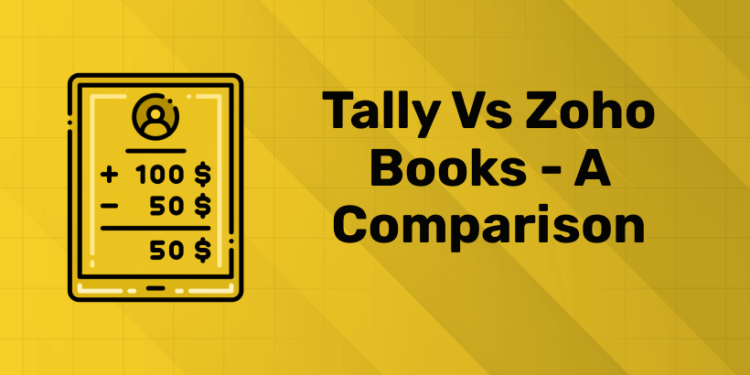Table of Contents
Effective accounting is essential for businesses to manage finances, track costs and ensure compliance with tax regulations. Two leading accounting software, Zoho Books and Tally, offer many features to streamline your finances.
In this article, we will explore the similarities and differences between these two solutions. While both Zoho Books and Tally serve as comprehensive accounting tools, they have unique attributes and features that address unique needs. By understanding these differences and reviewing their key features, you can make an informed decision about which accounting software is best for your business.
Let’s compare Zoho Books and Tally. Zoho Books and Tally are two leading competitors in the field of accounting software, each with their own strengths to meet other financial management needs together.
Boost your career with our accredited accounting course! Get a free Demo!
Zoho Books stands out with its user-friendly interface and comprehensive accounting features. It is especially appreciated by small and medium-sized businesses for its ability to simplify accounting tasks and streamline financial operations. On the other hand, Tally is known for its strong accounting capabilities and long-standing reputation in the industry.
It is highly regarded for its powerful financial reporting and analysis tools, making it the preferred choice for businesses that need in-depth financial knowledge and compliance with complex tax regulations. When choosing between Zoho Books and Tally, it’s essential to evaluate your specific business needs and financial requirements.
If you appreciate user-friendly accounting with comprehensive features, then Zoho Books could be the ideal solution for you. However, if your business requires advanced financial reporting and compliance features, Tally may be the most suitable choice.
What is the difference between Zoho Books and TallyPrime?
Tally is traditionally installed on a local computer and data is stored locally. Zoho Books and Tally are both powerful accounting software solutions but have clear differences that make them suitable for different business needs.
One of the fundamental differences between Zoho Books and Tally is their approach to accounting. Zoho Books is cloud-based accounting software, which means you can access your financial data from anywhere with an internet connection. It offers the flexibility of online collaboration and real-time updates.
On the other hand, Tally is traditionally installed on a local computer and data is stored locally. This can be beneficial for businesses with security concerns or those operating in areas with unreliable Internet connections.
Another significant difference is the range of features and functions they offer. Zoho Books offers a comprehensive set of accounting tools, including invoicing, expense tracking, bank reconciliation, and financial reporting. It also offers features like inventory management and project tracking.
On the other hand, Tally is known for her strong financial accounting abilities. He excels in complex financial reporting, regulatory compliance and tax management. If your business primarily requires in-depth financial analysis and compliance, Tally may be the preferred choice.
Integration capabilities also vary. Zoho Books integrates seamlessly with other Zoho applications and offers integration with a variety of third-party software, making it suitable for businesses looking to create an integrated software ecosystem.
Tally, while offering some integrations, can have limitations in this regard, especially compared to a cloud-based solution like Zoho Books. Additionally, the user experience differs between the two.
Zoho Books is known for its user-friendly and easy-to-use interface, making it accessible to businesses without extensive accounting expertise. Tally, while powerful, may have a steeper learning curve and is generally considered more suitable for experienced accountants.
Boost your career with our accredited accounting course! Get a free Demo!
Zoho Books pros and cons
What are the advantages of Zoho Books?
- User-friendly interface: Zoho Books has an intuitive and user-friendly interface that is accessible to users with varying levels of accounting expertise. This ease of use can save time and shorten the learning curve for your team.
- Cloud-based accessibility: As a cloud-based solution, Zoho Books allows you to access your financial data from anywhere with an internet connection. This is especially beneficial for working remotely and collaborating with team members or accountants in different locations.
- Comprehensive accounting features: Zoho Books offers a variety of accounting features, including invoicing, expense tracking, bank reconciliation, and financial reporting. It also supports multiple currencies and tax regulations, making it suitable for international businesses.
- Integration capabilities: Zoho Books integrates seamlessly with other Zoho applications as well as many third-party software, allowing you to create an integrated software ecosystem that meets the specific needs of your business Friend.
- Affordable: Zoho Books offers competitive pricing plans, making it an affordable choice for small and medium businesses. Flexible pricing options cater to businesses with varying financial needs.
What are the disadvantages of Zoho Books?
- Limited advanced accounting features: Although Zoho Books is very powerful, it may lack some advanced accounting features that larger businesses or highly specialized industries need. Businesses with complex accounting needs may need to consider alternative solutions.
- Integration complexity: Although Zoho Books offers integration options, installing and configuring these integrations can sometimes be complicated, especially for users who are not knowledgeable about the technology.
- Limited customization: Zoho Books offers customization options, but they may not be as varied as some other accounting software solutions. Highly customized reports or specific workflows can be difficult to achieve.
- Customer support response time: Some users have reported slower response times from Zoho’s customer support compared to other software providers. This is likely to affect how quickly you can resolve problems or get help.
- Learning curve for advanced features: While the basic features are user-friendly, mastering Zoho Books’ more advanced features may require training or an investment of time. Users with complex accounting needs may find the learning curve steeper.
TallyPrime pros and cons
What are the advantages of TallyPrime?
- Strong financial accounting: Tally is known for its solid financial accounting capabilities. It excels in areas such as general ledger management, journal entry, and financial reporting, making it the preferred choice for businesses with complex accounting needs.
- Local Installation: Tally is typically installed locally on a computer, which can benefit businesses with security concerns or those that operate in areas with an Internet connection unreliable. Data is stored on-site, giving you direct control over your financial data.
- Compliance and Tax: Tally provides comprehensive tools for legal compliance and tax management. It supports various tax regulations and provides features to create and file tax returns accurately.
- Data Security: As an on-premises solution, Tally provides an additional layer of data security. You have full control over your data, reducing the risk of data breaches associated with cloud-based solutions.
- Cost Savings: Tally is often considered cost-effective, especially for businesses with simple accounting needs. Initial purchase costs and annual renewal fees are typically lower than some cloud-based alternatives.
Boost your career with our accredited accounting course! Get a free Demo!
What are the disadvantages of TallyPrime?
- Limited cloud access: On-premises installation of the Tally can be a limitation for businesses that require remote access to their financial data. Cloud-based solutions provide greater accessibility, especially in today’s remote work environment.
- Learning Curve: Tally may have a steeper learning curve, especially for users unfamiliar with accounting principles or those switching from other accounting software. Extensive training may be necessary to maximize a person’s abilities.
- Lack of real-time collaboration: Local installation of Tally limits real-time collaboration. Multiple users cannot work on the same data set simultaneously, which can be disadvantageous for companies with distributed teams.
- Limited integration options: While Tally offers some integration options, they may not be as extensive as cloud-based accounting software. This can be a limitation if your business relies on multiple integration tools.
- Update and Support Costs: Tally often requires paid update and support plans, which can increase total cost of ownership over time. These costs can add up, especially if you need ongoing support or updates.
Zoho Books compared to TallyPrime
Zoho Books and Tally are two popular accounting software. A cloud-based platform for small and medium-sized businesses, Zoho Books provides easy accessibility and a straightforward user interface. It has comprehensive accounting tools and integrates with many third-party applications.
On the other hand, Tally, a traditional on-premise software, excels in robust financial accounting and regulatory compliance. It offers enhanced data security and is preferred by businesses with complex accounting needs. Choosing between them depends on factors like accessibility preferences, size of accounting requirements, and integration needs, with Zoho Books catering to a broader range of users.
Is Zoho Books better than TallyPrime?
Determining whether Zoho Books is superior to Tally depends on the specific needs of your business. Zoho Books offers an easy-to-use, cloud-based accounting solution with features like invoicing, expense tracking, and financial reporting, aimed at small and medium-sized businesses looking for accessibility and integration.
In contrast, Tally is a well-known on-premises software with strong financial accounting and regulatory compliance capabilities, ideal for businesses with complex financial requirements and prioritizing data security. The choice should be based on factors such as accounting depth, accessibility, integration requirements and budgetary considerations, with each tool excelling at different aspects of financial management.
Boost your career with our accredited accounting course! Get a free Demo!
What is Zoho Books used for?
Zoho Books is best for small and medium businesses looking for a user-friendly, cloud-based accounting solution. It simplifies financial operations by providing invoicing, expense tracking, bank reconciliation, and reporting tools.
Zoho Books is especially effective for businesses that need accessibility because it allows users to work from anywhere with Internet access. It supports multiple currencies and tax regulations, making it suitable for international operations.
Additionally, its integration capabilities allow users to create a personalized software ecosystem. In general, Zoho Books is a versatile accounting software that helps businesses in simplifying their financial operations with ease, flexibility, and efficiency.
Zoho Books vs TallyPrime: Which is better for your business?
Zoho Books is the best tool for you if:
- You need a user-friendly accounting solution with a modern interface for streamlined financial management.
- You want accounting software based on cloud provides access from anywhere, anywhere with an Internet connection
- Your business needs comprehensive accounting features, including invoicing, expense tracking, and bank reconciliation.
- You are a small to medium sized business looking for affordable plans that fit your budget?
- You are looking for integrations to create a custom software ecosystem that meets your business’s specific needs
TallyPrime is the best tool for you if:
- Your business has complex financial accounting requirements and requires strong legal compliance features
- You like on-premises software with advanced security and data control over your financial data
- You operate in areas with complex tax regulations and need comprehensive tools for management and reporting tax statement
- You can invest in the initial purchase cost and annual renewal fees to manage your finances profitably in the long run
- You need features like shipment and expiration management, godown management, and supports multiple inventory valuation methods in your inventory management.
Conclusion
The Practical Accounting course is designed to provide students with a comprehensive understanding of accounting principles and practices. The course covers everything from basic concepts to complex subjects and includes practical projects. Focusing on Zoho Books can help you develop valuable skills. The program also covers UAE Accounting & Finance, providing knowledge of banking, taxation, labor law, and corporate law.
Learning accounting can be a daunting task, but the rewards of mastering this skill can be invaluable. With Entri, you can learn accounting in an effective and efficient way to maximize the benefits of mastering this skill. Entri offers comprehensive and engaging courses that make learning accounting easier than ever before. With Entri, you can become an expert in accounting and unlock many potential opportunities. We provide
- Recorded & Live Sessions
- Personal Mentorship
- Expert Training
- Course Certificate
- Guaranteed Internship
- Placement Assistance
- 100+ Hiring Partners










